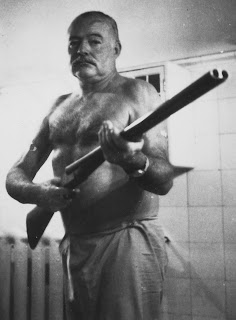There were times when I thought my
17 years as a journalist would eventually take its toll on my health.
 |
| Missing? A bottle of scotch. |
§ We
eat horribly. Probably half a journalist’s meager paycheck goes into the
vending machines in the break room, our freezer is filled with microwavable
boxes and election night pizza is the greatest gift to mankind.
§ Our
desks are examples of what not to do when company comes over. The only thing
messier than a journalist’s desk is a town after a tornado. And there is food
on that desk covered in notes from a months old city council meeting. It’s
probably still good.
§ Given
our penchant for correcting grammar, we’re not fun friends to have on social
media. We publicly mock those we barely know for using the wrong form of
“there,” and feel good about ourselves after, until we get punched in the nose.
There are plenty more correct
stereotypes – don’t even get me started about hygiene. Please, don’t – but
those are minor compared to the two most glaring stereotypes ever exhibited by
journalists from the likes of Mike Royko to Hunter S. Thompson (if those names
don’t ring a bell insert Perry White and Lou Grant).
Many writers drink. Edgar Allen
Poe, F. Scott Fitzgerald, William Faulkner, the list of whiskey-hounds is too
long to finish, so I’ll skip to Ernest Hemingway. Hemingway wasn’t just a
writer; he was a journalist and never met a bottle he didn’t empty, usually
before noon.
But as romanticized as boozing
journalists have become, journalists drink something a lot more often than alcohol
– coffee.
According to the UK’s Guardian
newspaper, 85 percent of 10,000 journalists surveyed claimed to drink at least
three cups of coffee a day, and 70 percent of them “admitted that their working
ability would be affected without a daily mug of coffee.” Journalists, the
study found, drink more coffee than do cops.
That’s a lot. Enough to be
dangerous?
Over the years coffee has been
blamed for an increased risk of cancer, cardiovascular disease and
schizophrenia-like symptoms. Although coffee has recently been removed from the
list of Items that Cause Cancer, Cardiovascular Disease and Other Things Nature
is Trying to Kill You With, it still messes with your brain.
According to livescience.com,
people (journalists count as people) who drink three cups of coffee a day are
“more likely to hallucinate.”
 |
| We all feel like that behind the keyboard. |
Cool.
But that’s not the good news.
A recent study of 27,793 coffee
drinkers over a 10-year period showed drinking three cups of coffee a day
(enough to make you see things that aren’t there) protects your liver, the one
thing many writers and journalists have been trying to destroy with booze all
these years.
So coffee turns writers and
journalists into some kind of supermen.
Did journalism give me bad heath?
I think not.
Jason Offutt’s parody survival guide, “How to Kill Monsters Using Common Household Items,” is available at amazon.com.



